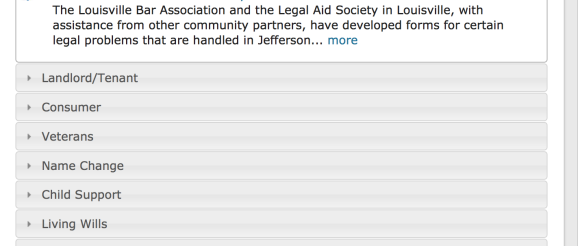Document assembly tools to automatically create forms | Justice Innovation

There are many HotDocs and A2J document assembly projects that have been funded by TIG that have replication potential. Listed below is a brief synopsis of a couple of those projects.
From South Central Michigan: automated forms completion.
Legal Services of South Central Michigan developed information and resources for self-represented litigants throughout the state. The project team developed interactive document assembly interviews using technology platforms and applications developed through the TIG program — specifically LawHelp Interactive and A2J Author — and generous software donations from the HotDocs Corporation.
These interactive interviews guide users through otherwise complex legal documents. In total, seven automated interviews were created that help users complete 17 different forms or documents in the areas of housing law, public benefits law,family law, and consumer law. As of June 2014, website users accessed these interviews to compile 2700 sets of organized legal documents that clearly presented their legal arguments and enhanced their likelihood of meeting their legal need.
Here’s the LSC-TIG final report TIG 11017: Michigan Automated Forms
Automated forms from Legal Aid of Nebraska:
Legal Aid of Nebraska partnered with the Nebraska Supreme Court Pro Se Implementation Committee to increase access to justice through the creation of innovative, effective and efficient automated legal pleadings.
The primary goal of this project was to create guided interviews and court form templates to improve low income Nebraskans’ access to the court system. To accomplish this goal, the objective was to take existing “court-authorized” form pleadings and automate them using the HotDocs software.
Then, the project team would apply the Access to Justice Author (A2J Author) interface and guided interviews to ensure that the forms completion process was interactive and easy for the user. Finally, the forms would be stored on the Law Help Interactive (LHI) server and links to the forms would appear on the Virtual Self Help Center section of the Nebraska statewide website.
Leveraging a modest TIG investment ($29,100), the project team produced a very impressive list of forms for low-income Nebraskans.
See the LSC-TIG final report here, TIG 10047: Nebraska Automated Forms
In Louisville, Kentucky: a way to populate forms for people filing for divorce themselves.
Legal Aid Society Inc. (Louisville, KY) partnered with Jefferson County Family Court to develop a pro se divorce packet for Divorce With Children and for Divorce Without Children and to promote the establishment of statewide uniform forms through the development of document assembly products.
LAS created the Kentucky Online Self‐Help Assistant (KOSHA) to provide low‐income Kentuckians the forms needed to easily, accurately, and effectively produce pro se pleadings and increase the effectiveness and efficiency of the courts. They also translated the Divorce Without Children module into Spanish and added forms for small claims and criminal record expungement.
They began this project in Jefferson County and worked to expand it to 10 additional jurisdictions, since each of Kentucky’s 57 judicial districts had adopted local rules on what needed to be filed to obtain court review. As the forms became accepted by more jurisdictions, the Chief Justice of the Supreme Court of Kentucky made the Jefferson County divorce forms (With‐ and Without‐ Children) the statewide standardized form packet for self‐represented litigants in Kentucky.
See the report from LSC-TIG here: TIG 07357: Kentucky HotDocs
